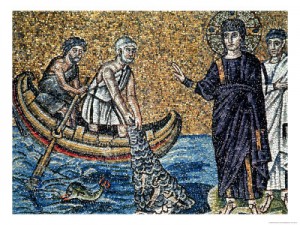 The old joke is still funny: Why did Peter deny Jesus? Peter was still mad that Jesus healed his mother-in-law. All kidding aside, many non-Catholics look at the indisputable fact that Peter had a mother-in-law (who was indeed healed by Jesus in Mark 1:30-31), and therefore must have had a wife, and consider the Catholic practice of clerical celibacy – well, a bad joke. They ask, “How can the Catholic Church require priestly celibacy when it’s clear that at least Peter – and possibly other Apostles – were married?”
The old joke is still funny: Why did Peter deny Jesus? Peter was still mad that Jesus healed his mother-in-law. All kidding aside, many non-Catholics look at the indisputable fact that Peter had a mother-in-law (who was indeed healed by Jesus in Mark 1:30-31), and therefore must have had a wife, and consider the Catholic practice of clerical celibacy – well, a bad joke. They ask, “How can the Catholic Church require priestly celibacy when it’s clear that at least Peter – and possibly other Apostles – were married?”
Today’s Gospel sheds light on both the Catholic practice in general, and Peter’s particulars. This is good evidence that Jesus himself required his apostles to share his way of life:
Peter began to say to Jesus,
‘We have given up everything and followed you.”
Jesus said, “Amen, I say to you,
there is no one who has given up house or brothers or sisters
or mother or father or children or lands
for my sake and for the sake of the Gospel
who will not receive a hundred times more now in this present age:
houses and brothers and sisters
and mothers and children and lands,
with persecutions, and eternal life in the age to come.
But many that are first will be last, and the last will be first.”
– Mark 10:28-31
The fact of the matter is that many clerics were ordained as married men in the early Church, but here’s the thing: they were required to be continent (abstain from marital relations) after ordination. There’s plenty of evidence that this practice dates to the Apostolic age and continued in both East and West. Strong documentation is found in Christian Cochini’s The Apostolic Origins of Priestly Celibacy, and Stefan Heid’s Celibacy in the Early Church, both published by Ignatius Press. Wives of potential clerics had to agree to such a change, or the ordination could not be carried out.
Peter, as Jesus indicated, left his wife and family home behind to follow Jesus more closely, as the Apostolic band roamed the countryside of Galilee. But this did not in any way indicate that he cruelly abandoned his bride, if she was indeed still living at the time. The extended family unit was paramount in Eastern cultures of the time, as it still is in many cases today. Many family members would often live under the same roof, and Mark notes that the healing of Peter’s mother-in-law occurred at Peter’s home in Capernaum. Peter’s wife would have been cared for. It is hardly imaginable that Jesus, who so despised divorce (which left women in a very precarious economic predicament in those days), would have advocated a cold dismissal of one’s spouse in order to be an Apostle.
Recently, the prominent canon lawyer Edward Peters has argued that the Church should return to her historical roots and that all clerics in higher orders, including permanent deacons (who currently are not required to do this), should observe the ancient practice of clerical continence. You can read his take here.

